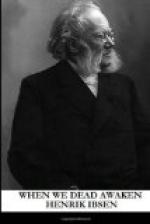[Evasively.] Not quite in the middle. I had unfortunately to move that figure a little back. For the sake of the general effect, you understand. Otherwise it would have dominated the whole too much.
IRENE.
But the joy in the light still transfigures my face?
PROFESSOR RUBEK.
Yes, it does, Irene—in a way. A little subdued perhaps—as my altered idea required.
IRENE.
[Rising noiselessly.] That design expresses the life you now see, Arnold.
PROFESSOR RUBEK.
Yes, I suppose it does.
IRENE.
And in that design you have shifted me back, a little toned down—to serve as a background-figure—in a group.
[She draws the knife.
PROFESSOR RUBEK.
Not a background-figure. Let us say, at most, a figure not quite in the foreground—or something of that sort.
IRENE.
[Whispers hoarsely.] There you uttered your own doom.
[On the point of striking.
PROFESSOR RUBEK.
[Turns and looks up at her.] Doom?
IRENE.
[Hastily hides the knife, and says as though choked with agony.] My whole soul—you and I—we, we, we and our child were in that solitary figure.
PROFESSOR RUBEK.
[Eagerly, taking off his hat and drying the drops of sweat upon his brow.] Yes, but let me tell you, too, how I have placed myself in the group. In front, beside a fountain—as it were here—sits a man weighed down with guilt, who cannot quite free himself from the earth -crust. I call him remorse for a forfeited life. He sits there and dips his fingers in the purling stream—to wash them clean—and he is gnawed and tortured by the thought that never, never will he succeed. Never in all eternity will he attain to freedom and the new life. He will remain for ever prisoned in his hell.
IRENE.
[Hardly and coldly.] Poet!
PROFESSOR RUBEK.
Why poet?
IRENE.
Because you are nerveless and sluggish and full of forgiveness for all the sins of your life, in thought and in act. You have killed my soul —so you model yourself in remorse, and self-accusation, and penance— [Smiling.] —and with that you think your account is cleared.




